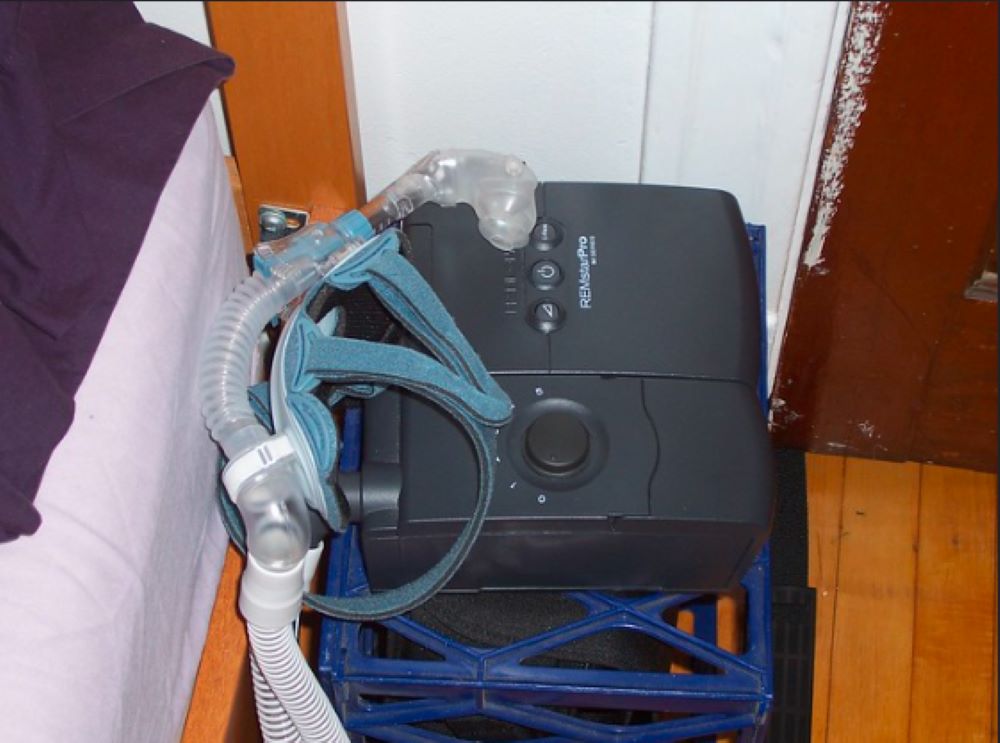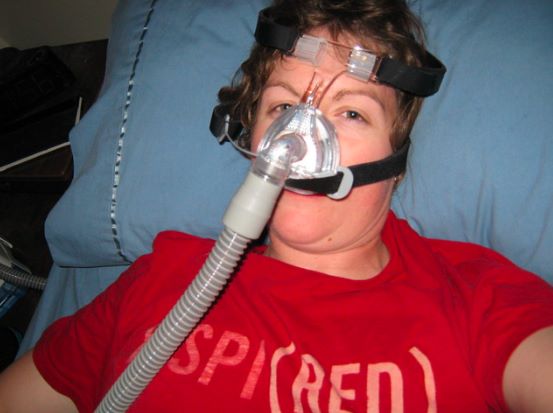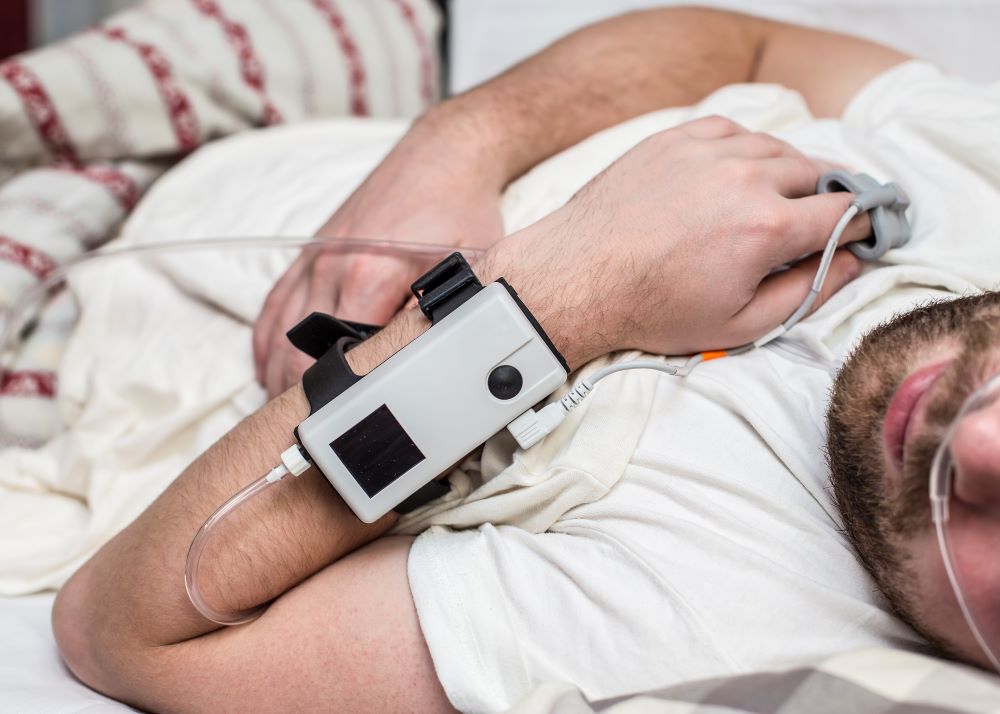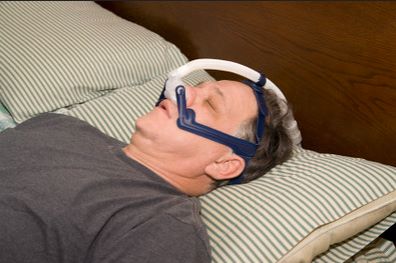What is an Apnea Monitor and How to Use it?

An apnea monitor is a medical device that keeps track of the respiration and heart rate of a baby or adult. This device ensures that a baby is breathing properly. It starts to show an alert when a baby’s breathing or heart rate stops or slows down.
Apnea monitors are applied in domestic and NICU contexts. They are beneficial for infants at risk of frequently experiencing apneic spells. Continue reading this article to know more about the apnea monitor.

Table of Contents

What is Apnea in Infants?
Apnea refers to breathing cessation in newborns and can be caused by physiological and pathological factors. Periodic breathing, which means brief apnea, happens in small cycles of 5 to 10 seconds and is not pathogenic. Periodic breathing usually appears between the ages of two and four weeks and stops by six months.
Although it can happen at any age, premature babies are often diagnosed with apnoea. Infantile apnea is an unexplained episode of stopping breathing for 20 seconds or longer or a shorter respiratory pause combined with bradycardia, cyanosis, pallor, and severe hypotonia.
What are the Types of Apnea in Infants?
Apnea occurs in 50% of infants born between 33 to 35 weeks of gestation and is rare in full-term infants. There are mainly three types of apnea in infants:
1. Central Apnea
The depressed respiratory centre, which occurs when there is no breathing effort and no output from the central respiratory centres, is central apnea. There is no drive to breathe in central apnea since the controlling and regulating neural pathways of breathing are not doing as they should. This type may be present with premature birth.
2. Obstructive Apnea
Obstructive apnea occurs when the airway is blocked and breathing is insufficient to ventilate it. This usually occurs due to a block in the upper airway caused by collapse or blockage in other ways, mainly the soft tissues or other structures of the throat. In infants, obstructive apnea presents as noisy breathing and choking or gasping.
3. Mixed apnea
A combination of obstructive and central apnea, often first having a period of central apnea followed by airway obstruction. It results from immature respiratory control in preterm babies. Management of these neonates is supportive, where intermittent positive pressure ventilation or caffeine therapy stimulates breathing and improves respiratory stability.
What Is Apnea Monitor?

This medical device is used to keep track of the breathing of an infant or adult with a risk of respiratory failure. Medical professionals recommend this portable device for infants, especially premature babies diagnosed with apnea.
Apnea is a serious sleeping disorder where the breathing repeatedly starts and stops. When your baby's breathing or heart rate stops, an alert on the monitor sounds. The monitor is portable and small.
What are the Benefits of Apnea Monitor?
Apnea monitors have done a great deal in enhancing infant safety and providing highly valued health insights. Some of the benefits of an apnea monitor are as follows:
What are the Uses of Apnea Monitor?

An apnea monitor is a device that detects and monitors episodes of apnea, which is transient cessation of breathing. Such devices are crucial for managing respiratory health and alerting, in real-time, to breathing anomalies. The main uses are as follows:
What are the Risks of Apnea Monitor?
The side effect of an apnea monitor is that it causes skin pain due to the electrodes in contact with the baby's skin. However, it is not a big concern, considering the device's several benefits.
In case your device has a backup battery system, you should consult your medical professional and understand how to maintain a constant charge.
While apnea monitors are greatly useful in monitoring breathing patterns in infants, especially those at risk, they have some associated risks and potential concerns:
How Does Apnea Monitor Work?

An apnea monitor is equipped with several electrodes and/or a belt that is attached to the baby’s stomach or chest. In case the baby’s heart rate or breathing falls below the normal level, this device triggers an alert on its monitor. This device is also known as A/B or apnea and bradycardia monitor. Though there are different types of apnea monitors, every type of monitor consists of sensors that determine the breathing and heart rate of a body during sleep.
You can follow these steps to use the apnea monitor effectively:
Step 1: Place the device on your baby’s stomach or chest to use the stick-on patches or electrode patches.
Step 2: Attach the connectors of device electrodes to the device’s monitor.
Step 3: Switch on the monitor and wait until it generates the results.
Why People Use Apnea Monitor?
This medical device is used to monitor the breathing and heart rate of your baby and thus helps to keep a check on sleep apnea. Serious sleep apnea can lead to life-threatening situations. If left untreated, it can affect the sleep levels of the child and can hamper future growth and development.
This will provide vital information that allows health professionals to determine the degree of apnea and, if required, treat or intervene accordingly. To say the least, an apnea monitor is vital in mitigating risks associated with sleep apnea and will be conducive to general safety and health for the baby.
Safety Tips While Using Apnea Monitor for a Baby?
While using an apnea monitor, you should take care to protect your infant’s sensitive skin. Some of the tips that you can consider while using this device on your baby are as follows:
- Rub a mild moisturiser on your infant’s skin before they go to sleep.
- Avoid using creams or lotions before putting your baby to sleep.
- Make sure that your baby sleeps on their back on a hard mattress.
- Make sure there are no blankets, soft toys or pillows in the baby's crib.
- Do not apply powders or lotion on your infant's skin, as they can prevent the sensors from functioning optimally.
- Remove the adhesive pads from display, if any, and replace them as recommended by the manufacturer. Make sure not to change the pads more often than the recommended intervals to avoid the risks of inflation on your infant's skin
Protect What Matters - Explore Other Insurance Options














